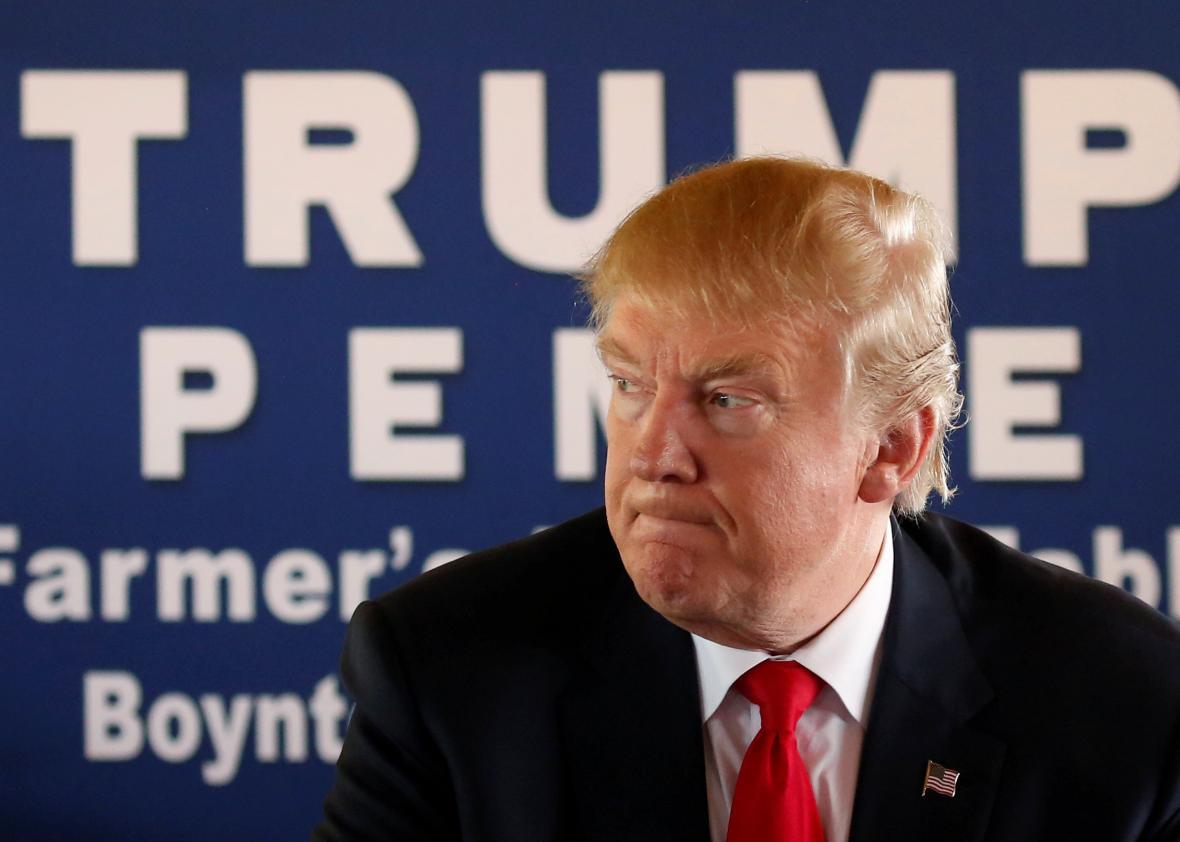Donald Trump is not the world’s most detail-oriented conspiracy theorist. The Republican nominee prefers to make blanket accusations that the election is being rigged by corrupt elites without getting too bogged down by the specifics of how or why. This weekend, however, his campaign addressed that obvious shortcoming in a handy, 312-word press release. Signed by economic adviser Peter Navarro, it implies that major media organizations have been skewing their coverage in favor of Hillary Clinton at the behest of corporate parent companies that benefit from off-shoring American jobs to China and Mexico (which, of course, Trump opposes). Invoking the trust-busting legacy of Teddy Roosevelt, it states that Trump would “break up the new media conglomerate oligopolies that have gained enormous control over our information, intrude into our personal lives, and in this election, are attempting to unduly influence America’s political process.”
In any other election, a major candidate party vowing to use the power of antitrust regulation to wage war on his enemies in the media might be considered breathtaking news. But in 2016, it’s just a day of the week that ends in y.
Given its timing, Trump’s press release seems to be a response to AT&T’s proposed merger with Time Warner, which a number of politicians, including Sen. Bernie Sanders and vice presidential candidate Tim Kaine, have voiced concerns about. Trump, too, is against the tie-up, but for perhaps less principled reasons. “AT&T, the original and abusive ‘Ma Bel’ telephone monopoly, is now trying to buy Time Warner and thus the wildly anti-Trump CNN,” the release states. “Donald Trump would never approve such a deal because it concentrates too much power in the hands of the too and powerful few.” While it’s refreshing to see a Republican candidate sound the alarm about industry consolidation—who’dathunk?—it’s a bit disconcerting that his team decided to frame the issue in terms of a personal vendetta (against a cable network that pays Jeffrey Lord, no less).
Navarro gets more explicit about the globalist conspiracy elsewhere. “NBC, and its Clinton megaphone MSNBC, were once owned by General Electric, a leader in offshoring factories to China,” we learn. “Now NBC has been bought by Comcast, which is specifically targeting the Chinese market—even as Comcast’s anchors and reporters at MSNBC engage in their Never Trump tactics.” So Rachel Maddow isn’t just catering to an ideologically liberal audience—apparently, she’s shilling for Shenzhen.* Meanwhile, we are informed that the New York Times’ “strings are being pulled by Mexico’s Carlos Slim, a billionaire who benefits from NAFTA and supports Hillary Clinton’s open border policies.” The Washington Post is implicated in the cabal as well; it’s owned by Jeff Bezos, who is the CEO of Amazon, which “profits from the flow of illegally subsidized foreign products through its distribution channels. Lower costs mean higher margins—no matter if bad trade deals lead to massive unemployment in America.” You can just imagine Navarro furiously drawing arrows on a chalkboard.
It is not crazy to think the U.S. should be more stringent about antitrust regulation. Neither is it absurd to fear how a massive, vertically integrated media monolith like a combined AT&T–Time Warner might wield its power to limit market competition. It is crazy, however, to treat the Sherman Act as a weapon for settling political scores, or to suggest that the Washington Post has been critical of the Trump Foundation because Amazon sells goods made overseas.
Also, it’s a bit odd that Navarro makes no mention of Fox News or how it may promote the personal political interests of a certain Australian billionaire. A mere oversight, I’m sure.
*Correction, Oct. 24, 2016: This post originally misspelled Shenzhen.
